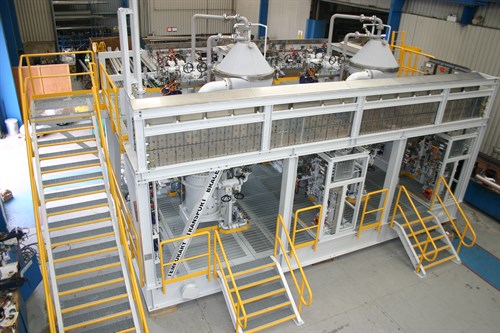GEA delivers on time for BP gas plant in Egypt
Technology group GEA has delivered two centrifuges for monoethylene glycol (MEG) purification at BP’s West Nile Delta offshore natural gas field in Egypt. The project represents an important new customer for GEA in its expanding MEG treatment business. MEG is used to protect gas pipelines from corrosion and blockage.
 |
The centrifuge package was delivered to BP’s gas treatment plant near the port of Alexandria in July 2017. Its two WSD 200 centrifugal separators run in parallel 24 hours a day to deliver excellent separation performance and reliable operation on a single skid measuring 12 x 7 x 6 metres.
Overcoming challenges to deliver on schedule
GEA started work on the project at the end of 2015 and supplied the centrifuges on schedule in around 65 weeks.
The complete MEG regeneration project was handled by the Wellstream Processing group, which is part of the Process and Flow Technologies business unit within National Oilwell Varco, L.P. (NOV). NOV’s head office is in Houston, Texas, USA. This is GEA’s fourth project with NOV, on this occasion working with the company’s office in Oslo, Norway.
“The GEA centrifuge technology in the NOV MEG Regenerations Units has been subject to varying process conditions, interfaces and client requirements,” said Bruno Sersante, Senior Mechanical Engineer, Wellstream Processing group. “We have seen how a very well prepared GEA team has been capable of delivering a complex package on a tight schedule and with a high quality standard. Their open approach has helped us to successfully meet the challenges set by our client along the way. NOV appreciates the proactivity and flexibility of the GEA team in meeting every challenge for the successful execution and delivery of projects on time and in budget.”
Jan Hoppe, Senior Project Manager GEA, agrees that good collaboration played a big part in this success. “I think we won the contract on our relationships with the project partners, our track record in handling projects of this size, and the technical performance of the WSD 200 centrifuges,” he says. “This was a challenging project, but we kept to the schedule and it was a fantastic effort.”
Centrifuge manufacturing and project management were done at GEA’s facility in Oelde, Germany. GEA’s Dubai office assisted with front-line contact. The centrifuge skid was assembled in Hereford, UK, by KGD, a trusted partner of GEA.
West Nile Delta: a strategic project
The West Nile Delta is a strategic project that will eventually supply almost 1.3 billion cubic feet a day (bcf/d) of gas, equivalent to about 30 per cent of Egypt’s current production. All this gas will feed into the Egyptian grid.
The complete development consists of five gas fields in water depths up to 750 m. BP holds an 83 percent stake, with the balance owned by German oil and gas company DEA AG. Production started in March 2017, with the remaining fields expected on stream in 2019.
Recovering and purifying MEG
On the West Nile Delta project, MEG purified by GEA’s equipment protects a 42-km pipeline carrying gas ashore from nine wells in the Taurus and Libra fields.
Once the gas reaches the processing plant the MEG is recovered and purified for re-use. The GEA centrifuges are an integral part of the NOV pre-treatment system, where they remove precipitated low-solubility salts and fines from the rich MEG. Subsequent purification steps include reconcentration and salt reclamation.
GEA’s MEG experience
GEA’s previous onshore projects for MEG purification include Kollsnes (Norway), Gorgon (Australia), Jansz (Australia) and Barzan (Qatar). Offshore MEG projects include Ormen Lange (Norway) and Ichthys (Australia).

- RWE strengthens partnerships with ADNOC and Masdar to enhance energy security in Germany and Europe
- TotalEnergies and Mozambique announce the full restart of the $20-B Mozambique LNG project
- Venture Global wins LNG arbitration case brought by Spain's Repsol
- KBR awarded FEED for Coastal Bend LNG project
- Norway pipeline gas export down 2.3% in 2025, seen steady this year



Comments